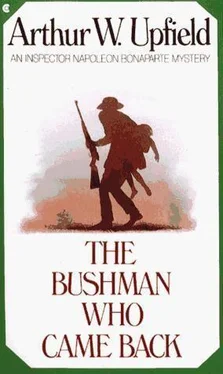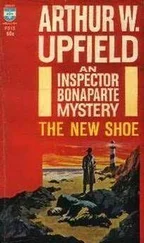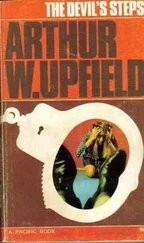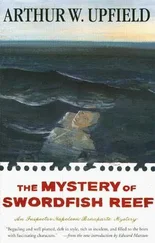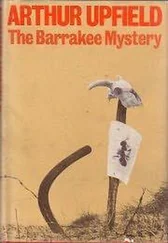Arthur Upfield - The bushman who came back
Здесь есть возможность читать онлайн «Arthur Upfield - The bushman who came back» весь текст электронной книги совершенно бесплатно (целиком полную версию без сокращений). В некоторых случаях можно слушать аудио, скачать через торрент в формате fb2 и присутствует краткое содержание. Жанр: Классический детектив, на английском языке. Описание произведения, (предисловие) а так же отзывы посетителей доступны на портале библиотеки ЛибКат.
- Название:The bushman who came back
- Автор:
- Жанр:
- Год:неизвестен
- ISBN:нет данных
- Рейтинг книги:4 / 5. Голосов: 1
-
Избранное:Добавить в избранное
- Отзывы:
-
Ваша оценка:
- 80
- 1
- 2
- 3
- 4
- 5
The bushman who came back: краткое содержание, описание и аннотация
Предлагаем к чтению аннотацию, описание, краткое содержание или предисловие (зависит от того, что написал сам автор книги «The bushman who came back»). Если вы не нашли необходимую информацию о книге — напишите в комментариях, мы постараемся отыскать её.
The bushman who came back — читать онлайн бесплатно полную книгу (весь текст) целиком
Ниже представлен текст книги, разбитый по страницам. Система сохранения места последней прочитанной страницы, позволяет с удобством читать онлайн бесплатно книгу «The bushman who came back», без необходимости каждый раз заново искать на чём Вы остановились. Поставьте закладку, и сможете в любой момент перейти на страницу, на которой закончили чтение.
Интервал:
Закладка:
Arnold nodded to Harte, and they left the office. The others watched them leave, knowing they did so at the behest of Bony’s note. Wootton cleared his throat preparatory to saying something, and was stopped by a screech from without.
Struggling figures appeared in the doorway, and the men brought in a furious lubra.
Chapter Six
The Art of Reasoning
“LEMMEGO, you Arnold Bray. Lemme go, I say,” shouted Sarah, and, having inserted the large woman into the office, Arnold and Harte freed her arms and blocked the doorway. Either Sarah was in excellent form, or the struggle hadn’t lasted long, but she now stood with fists balled into her hips, a glare in her eyes, and requiring only a broomstick or a rolling-pin to ape her white counterpart.
“She was round at the back wall with her ear to a crack,” announced Arnold. “Just listening in.”
“I was onlysittin ’ in the shade outside that hot ole kitchen,” shouted Sarah, and Wootton would have spoken had not Bony said, placatingly:
“Well, there’s no harm in that, Sarah. It’s deep shade here, and you are entitled to it. Still, there’s house shade outside the kitchen door, and I saw only an hour ago a nice chair. You go there and sit in that easy chair, or even better, what about morning tea?” Again Wootton attempted to speak, but Bony waved him to silence. The lubra’s black eyes encountered the blue eyes of the slim Napoleon Bonaparte, blue eyes hinting at laughter, friendliness, and abruptly she smiled:
“Mornin’ tea! Crikey! I forgot about it. That Meena! She should of told me.”
Nodding to Bony, she turned about, scowled at the men and went out like a cork down a drain.
“Well, whatd’you make of that?” demanded Wootton, his face flushed. “Eavesdropping for sure. You should have made her tell us why she was doing that, Inspector!”
“You cannot make those people do anything they don’t wish to do,” Bony said, coldly. “That she was listening is a point, but only that. We have to remember that she and Yorky were friends, and that she must be interested in his fate, as we are. I think you men may leave. Perhaps this afternoon or this evening we could get together again and talk. All right with you?”
They assented: then as they were about to go, young Lawton asked:
“Mind telling why you wanted us to mark that map with where we were that day Mrs Bell was murdered?”
“Not at all. It was mere police routine. You see, any one of you four men could have returned after Mr Wootton left that day, then shot Mrs Bell and taken the child away and killed her. Even you, Mr Wootton, could have done just that.”
“But what about Yorky? Yorky was known to come here that morning,” pressed Lawton, and the others nodded quick agreement.
“As I told you, it is merely police routine to establish the whereabouts of everyone at the assumed time the crime was committed. In fact I think Constable Pierce asked for that information, and that it is recorded in his report.”
“He did make a song and dance about it,” admitted young Lawton. “Looks like we’re all sort of suspect, don’t it?”
“Pierce acted rightly,” patiently continued Bony. “Look at it this way. Not one of you is supported by a witness as to what you did between the time you left the homestead and the time you returned. No one saw Yorky at the blacks’ camp other than Mr Wootton. To be sure, Bill Harte found Yorky’s tracks back of the meat-house, and showed them to Arnold Bray, who agreed they were his. To be sure, Yorky’s tracks were found at the homestead gate. Pierce took plaster casts of those tracks. Before Yorky is put on trial, if he is, the casts must prove that he actually made those tracks, that he was, in fact, at this homestead on that morning. A good policeman, and Pierce is a good policeman, leaves nothing to chance.”
“Fair enough,” supported Wootton. “All right, you men can take the day off, and if you think of anything, I’m sure the Inspector will be happy to talk it over.”
They were drifting across the square to the quarters when the morning tea gong was beaten, and they about-turned and went back to the meal annexe. Tea and buttered scones were served by Meena to Bony and his host on the house veranda, and when she had withdrawn, Bony questioned about her.
He learned that a religious body conducted a Mission Church and school a few miles out from Loaders Springs. Aborigines, both adults and children, were warmly welcomed. A large number of children chose to live at the Mission, chose to because there was no compulsion. They were taught the elementary subjects-drawing and painting, basketwork, needlework, woodwork, and in return assisted the pastor and his wife with the stock and the garden.
“I visited the place one afternoon,” Wootton said. “Surprised me, the work the children were doing in class. And how they sang, too! I had only just come here, was still raw to the country, and I asked the pastor what happened to the children when they left. He said: ‘Oh, the lads become stockmen, and the girls do domestic service round about. That’s when it suits them. We do our best, as we hope you can see, but after they leave us, the old ones get them back.’ ”
“I can understand that,” Bony agreed with the pastor. “Meena, though, seems to be an excellent maid.”
“I think so. Yes, she’s good in a house. But then neither she nor Sarah will stay here overnight, and there’s no telling that they’ll turn up in the morning, or go off with the others on a walkabout. That girl can sew and mend as good as Mrs Bell could. And Charlie-you saw him this morning-is a damn fine wood carver.”
Wootton stretched his thin, short legs and lit his pipe.
“You ought to see the dolls he carved for little Linda Bell. One is the dead spit of Ole Fren Yorky, and there’s another you’d say was my image. The one supposed to be Mrs Bell isn’t so good, but another one, of Meena, to my mind, is the best of the lot. We’ll go and see them if you like. They’re over in the playhouse.”
“Yes, I’d like to see them. I understand that the men built the playhouse. Which reminds me: did Linda spend much of her days there?”
“A good deal, Inspector,” replied the cattleman reflectively. “You know, you can’t wonder that we worshipped that child. Every Sunday afternoon she’d invite us all there for tea. Had her own tea set and her mother filled the teapot. I went sometimes. She’d have her visitors squatting on the floor, and she’d hand down her small cups and saucers and plates of scones and cake; and the men would talk to her with exaggerated politeness, and she would be the little lady.” Wootton sighed. “Only that last day I was commissioned to buy a box of chocolates and special handkerchiefs for her.”
A few minutes later they left the house for the canegrass playhouse. It was noticeable how the thick walls shut out the noises of the crows, the windmill raising water, and the soft hissing of the gusty wind over the ground. Standing within the entrance, Bony surveyed the interior, noting the cut-down furniture, and the fact that objects were not positioned as described by Constable Pierce. Almost at once Wootton exclaimed:
“Why, two of the dolls have gone! They were set up on the shelf bench. And those presents. The comb and the box of handkerchiefs have gone too. Now, what the hell!”
“When did you last see them?” asked Bony.
“Oh, about a fortnight back. The men wanted to tidy up the place, having the idea of making it nice for Linda’s return. I obtained permission from Pierce, and they went to work. Swept the floor, cleaned the window, put the dolls side by side on the bench, and the presents on the bench, too. I’ll call them.”
Читать дальшеИнтервал:
Закладка:
Похожие книги на «The bushman who came back»
Представляем Вашему вниманию похожие книги на «The bushman who came back» списком для выбора. Мы отобрали схожую по названию и смыслу литературу в надежде предоставить читателям больше вариантов отыскать новые, интересные, ещё непрочитанные произведения.
Обсуждение, отзывы о книге «The bushman who came back» и просто собственные мнения читателей. Оставьте ваши комментарии, напишите, что Вы думаете о произведении, его смысле или главных героях. Укажите что конкретно понравилось, а что нет, и почему Вы так считаете.
